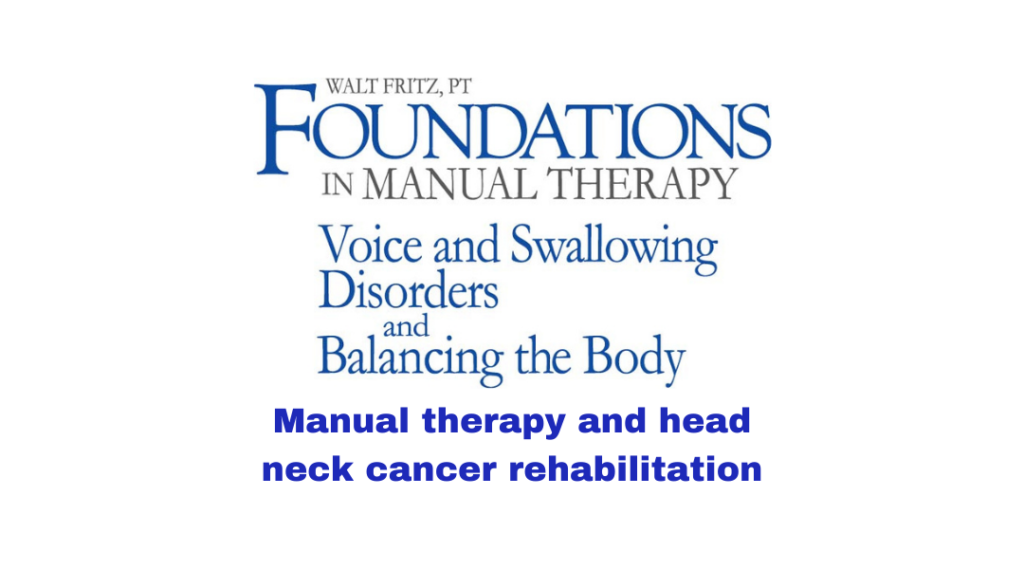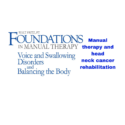
Manual therapy and head neck cancer rehabilitation
Does manual therapy (MT) have a legitimate place in the treatment of post-head neck cancer dysfunction? Many in the SLP field that there is not enough evidence to consider MT a legitimate, evidence-based intervention. I thought it time to look at the topic. While not common, evidence exists for MT’s utility in dysphagia, but much is focused on related dysphagia with muscle tension dysphonia (DiPietro, 2017, Laryngeal Manipulation for Dysphagia with Muscle Tension Dysphonia). Specific studies for post-radiation issues with head neck cancer are less common, though I see human administered, tool-assisted interventions (Therabite®, for instance) as a form of manual therapy. Such devices stretch the mouth opening, which is typically limited by irradiated, fibrotic tissues. Human-applied MT without such tools has less of an evidence trail, though Gintas Krisciunas has published a few papers worth unpacking. In her 2015 paper, A novel manual therapy program during radiation therapy for head and neck cancer – our clinical experience with 5 patients A novel manual therapy program during radiation therapy for head and neck cancer – our clinical experience with 5 patients, manual therapy was found to reduce the normal pain associated with radiation, which was opposite of the expectation that such intervention would be poorly tolerated.
“Key Points
- Manual therapy is typically used reactively as rehabilitation. It has not been used proactively during radiation therapy in the head and neck cancer population.
- Manual therapy has the potential to reduce pain, inflammation, and contracture, so there is a rationale for using manual therapy proactively during head and neck cancer therapy.
- Using our purpose built manual therapy protocol, all 5 patients experienced reductions in pain and 3/5 experienced improvement in mobility. There were no adverse outcomes.” (pg. 6)
While the study was small, it showed promising results with no adverse effects. In a wide-ranging 2019 paper (Application of Manual Therapy for Dysphagia in Head and Neck Cancer Patients: A Preliminary National Survey of Treatment Trends and Adverse Events), Krisciunas speaks to previously published research on manual therapy’s influence on reducing inflammatory cytokines responsible for dysregulation of fibrotic tissue formation following radiation in head neck cancer treatment. In the same paper, Krisciunas shares statistics showing a surge in interest by seasoned SLPs over the past 4 years and “(i)mportantly, the results of this survey reaffirm our own clinical experience, and suggest that if MT is provided to HNC patients by adequately trained clinicians, then it may not be any more dangerous than if applied to patients who suffer from globus or muscle tension dysphonia” (pg. 5).
While these two papers hardly count as robust and irrefutable evidence documenting MT’s utility in the treatment of HN cancer, they do establish clear precedence for its consideration as a treatment option. My hope is that the sheer number of clinicians using MT in this domain will spark further research to better establish MT’s place in this domain.
If you have studies relating to this topic, please leave them in the Comments section.
For now,
Walt Fritz, PT
Foundations in Manual Therapy Seminars
- DePietro, J. D., Rubin, S., Stein, D. J., Golan, H., & Noordzij, J. P. (2018). Laryngeal Manipulation for Dysphagia with Muscle Tension Dysphonia. Dysphagia, 33(4), 468–473. https://doi.org/10.1007/s00455-018-9875-x
- Krisciunas, G. P., Golan, H., Marinko, L. N., Pearson, W., Jalisi, S., & Langmore, S. E. (2016). A novel manual therapy programme during radiation therapy for head and neck cancer – our clinical experience with five patients. Clinical otolaryngology : official journal of ENT-UK ; official journal of Netherlands Society for Oto-Rhino-Laryngology & Cervico-Facial Surgery, 41(4), 425–431. https://doi.org/10.1111/coa.12535
- Krisciunas, G. P., Vakharia, A., Lazarus, C., Taborda, S. G., Martino, R., Hutcheson, K., McCulloch, T., & Langmore, S. E. (2019). Application of Manual Therapy for Dysphagia in Head and Neck Cancer Patients: A Preliminary National Survey of Treatment Trends and Adverse Events. Global advances in health and medicine, 8, 2164956119844151. https://doi.org/10.1177/2164956119844151
Please consider checking out the upcoming live seminars and online course offerings, including a full hands-on online course. You can find the information here. Also, read up on my in-person seminars at the links in the menu on this page.




Sorry, comments are closed for this post.